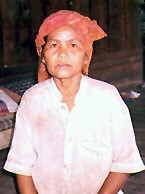Pacoh in Vietnam

Photo Source:
Copyrighted © 2026
Asia Harvest All rights reserved. Used with permission |
Send Joshua Project a map of this people group.
|
| People Name: | Pacoh |
| Country: | Vietnam |
| 10/40 Window: | Yes |
| Population: | 20,000 |
| World Population: | 35,000 |
| Primary Language: | Pacoh |
| Primary Religion: | Ethnic Religions |
| Christian Adherents: | 2.00 % |
| Evangelicals: | 0.17 % |
| Scripture: | New Testament |
| Ministry Resources: | Yes |
| Jesus Film: | No |
| Audio Recordings: | Yes |
| People Cluster: | Mon-Khmer |
| Affinity Bloc: | Southeast Asian Peoples |
| Progress Level: |
|
Introduction / History
The East Katuic language group comprises several tribes living in southern Laos near the border of Vietnam. These groups include the Ir, the Kantu, the Katang, the Lor, the Pacoh, and the Upper Taoih. Although they speak distinct dialects, they all belong to the East Katu branch of the Mon Khmer language family.
Most likely the Mon Khmer-speaking tribes were the original settlers of this region; however, they were pushed out of the best valley lands in the early centuries A.D. by Thai-speaking peoples. Although the Khmer civilization existed before other people groups moved into the region, their power declined after being conquered by the Thai and Vietnamese.
Today the Pacoh people live in Laos and Vietnam.
What Are Their Lives Like?
The Pacoh live in the mountainous regions where they practice slash and burn farming. Many also hunt and gather to supplement their diets. The villagers are self-sufficient. They grow their own rice, have their own vegetable gardens, gather fruit from the forests, and fish in the nearby ponds, rivers, or even in the rice fields! They trade surplus rice and produce in the market for salt and other necessities.
Pacoh families are patrilineal, so they trace the line of descent through the males of the family. Villages comprise extended family units, who usually live in "longhouses" (long, communal dwellings that have central corridors with family compartments on either side). These long houses are built on stilts and strategically organized in geometric patterns as a means of protection. They raise pigs, chickens and ducks under or near their houses.
A loosely organized council of elders governs each village. Of the elders is considered the "village headman." He is the link to the central government, but his role is not clear. In Buddhist settlements, the core of the village is a Buddhist temple where a monk lives.
What Are Their Beliefs?
The overwhelming majority of the Pacohs are ethnic religionists. Although they may recognize a creator god, they also worship and fear a large group of spirits called phi. These spirits have much influence over their daily activities. They sacrifice to the phi that they believe inhabit the rivers, forests and mountains in order to gain their favor.
What Are Their Needs?
The Pacoh people need better medical facilities and schools so they can compete in Vietnam's rapidly modernizing economy.
Prayer Points
Pray that a family-based movement to Christ will soon transform Pacoh society, blessing them spiritually and economically.
Pray for Pacoh decision makers in Vietnam to open their communities to Christ's ambassadors.
Pray the hearts of the Pacoh people would be stirred to hunger after God, to drink of living water.
Pray for the Lord to move in the hearts of believers to give up their own rights and sacrifice their lives to see the Pacoh people blessed by the work of Jesus Christ, the only Savior.